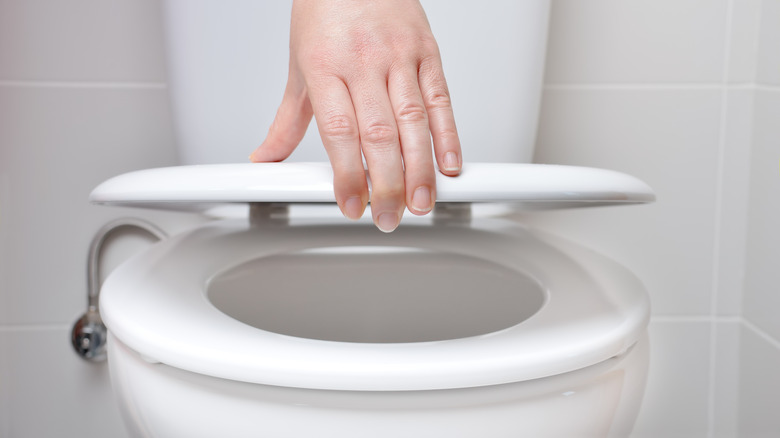What It Means When Your Poop Is Frothy
Doing your business in the bathroom isn't something most individuals particularly care for, but it's a fact of life. And paying attention to how things are coming out can give you insight into your digestive and gut health. It can also give you a clue about your overall health.
Having one movement with frothy poop means you ate something that went through your digestive system too fast. Maybe you overindulged in delicious broccoli at the cookout. You might have been trying to use up the cabbage in your fridge and made a day of it. However, frothy poop that happens regularly can signal that something is amiss with your digestive system. Malabsorption is a common reason for foamy stool and means that your body isn't absorbing nutrients as it should (per Cleveland Clinic). Since this can lead to malnutrition, it's vital to grab your magnifying glass to start investigating.
You can become your own health detective by finding a few common culprits of frothy poop and learning when to head to your healthcare professional because something foul is afoot.
Gastrointestinal diseases are a common culprit
A frothy stool here or there isn't something that you need to be concerned about. But when it starts to happen for more than a few weeks and is combined with other symptoms like diarrhea and gastrointestinal pains, it means something is going on in your gut. So, you'll want to take a trip to your healthcare specialist.
Gastrointestinal disorders come in a lot of different types. A common one to cause frothy stools is food intolerance. Lactose intolerance is when your body can't break down lactose in milk products, states John Hopkins Medicine. So, you might get bloating, gas, diarrhea, and other digestive issues upon eating it. Celiac disease is another common food intolerance that can lead to small intestine damage, according to Mayo Clinic. Those with this disease need to avoid gluten to ensure that they don't have serious complications.
The National Institute of Diabetes and Digestive and Kidney Diseases also discusses the digestive disease irritable bowel syndrome (IBS) leading to frothy poop. Depending on your type, during a flare-up, your food can move too quickly through your bowels, leading to malabsorption. Treatment for this disorder typically involves changing your diet because certain foods should be avoided when you have IBS.
Intestinal infections can cause frothy poop
Changes happen in your body all the time. While having a bout of frothy poop might mean that you have a condition within your guts, it can also be due to bacteria or a virus. Gastrointestinal infections lead to bouts of loose stool, nausea, vomiting, and dehydration.
Coming in contact with foods and drinks exposed to E. coli or Salmonella bacteria can lead you to run to the bathroom frequently (via Healthline). A severe case might require a trip to outpatient care when accompanied by a high fever. Stomach bugs, like norovirus and rotavirus, can also cause you to experience frequent frothy stools. These bugs wreak havoc on your intestines and are spread by coming into contact with someone else that has them. Healthdirect notes that a bout of a viral infection typically clears up in a few days, and it's common among children.
Most cases of food poisoning and stomach bugs clear up without medical intervention. Getting lots of rest and fluids is essential to replenish your body. You'll also want to wash your hands and cook your food well to avoid contracting it.
Frothy poop can be from pancreatitis
Fluffy, foamy poop can also be a symptom of something happening outside of your guts. Organs that affect your bowel movements can cause changes to your stool when they are having an issue. The pancreas sends out the enzymes that break everything down in your gut. So, when it's experiencing inflammation, you will notice a change in your stool.
Pancreatitis is swelling and pain in the pancreas due to enzymes attacking the organ because of gallstones or alcohol misuse (per John Hopkins Medicine). While most cases of this condition happen suddenly (acute pancreatitis), some people can experience swelling of their pancreas off and on (chronic pancreatitis). Fatty poop is most common in those that experience chronic pancreatitis, says Cleveland Clinic. It also comes with symptoms of weight loss, indigestion, and pain. When a flare-up happens, you might also experience a fever.
The treatment of the disorder depends on the cause. Acute pancreatitis might lead someone to the hospital to get an IV and antibiotics. Chronic suffers have to make lifestyle changes to help cope with the symptoms. It might also be a necessity to have your gallbladder removed.
Parasites might be at play
It might seem scary, but stool changes signal that a parasite has made its way into your digestive tract. Since they are getting their nutrition from your guts, they affect how everything is working. A common parasite linked with frothy poop is Giardia. These get access to your system through drinking unsafe water or traveling to areas with poor sanitation.
The Centers for Disease Control and Prevention states that a Giardia infection (giardiasis) causes diarrhea, vomiting, and stomach pain. It can also lead to dehydration and a fever. The symptoms typically begin after a few weeks of being infected with the parasite. New York State Department of Health notes that some cases of giardiasis can clear up on their own, but you'll typically need to get meds to kill the parasites and remove them from your system. You can prevent an infestation by avoiding drinking from streams and washing your hands thoroughly.
Having a bout of frothy poop doesn't always mean you need to make an appointment with your healthcare provider because it's typically due to what you ate. However, chronic fluffy or smelly poop might mean that something is amiss in your stomach.





